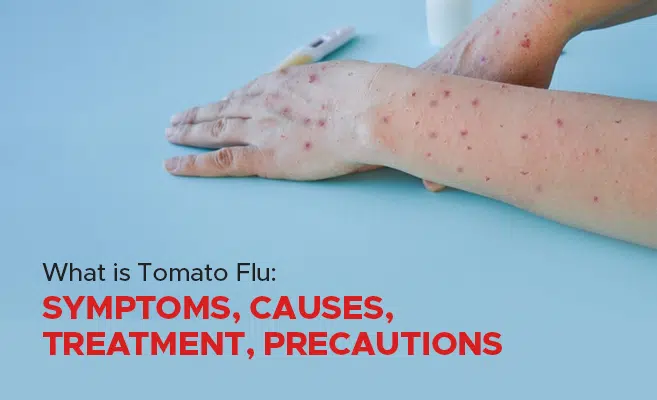Tomato Flu: Symptoms, Causes, Treatment, Precautions

The flu caused concern in the district by affecting around 80 children. It has been found that children exposed to the flu are below or till five. The cases are found with similar symptoms in Anchal, Aryankavu, and Neduvathur. If you find your child with any of these symptoms, take them to the nearest hospital for immediate treatment and diagnosis.
The Health Department is observing the rise of flu because the disease is affecting children under the age of five. It’s not encouraging because all confirmed cases have been reported from local government hospitals and involve children. Tomato Fever was reported with 172 cases in Kollam alone.
Symptoms of Tomato Virus
Tomato virus symptoms are similar to Chikungunya, including high fever, body aches, joint swelling, and fatigue. There are a few symptoms that also need consideration.
The Primary Tomato Virus Symptoms:
- Tomato-like red blisters
- High fever
- Dehydration
- Swelling in the joints
- Body ache
- Rashes
- Lethargy
Some other symptoms include:
- Discolouration of hands, knees, and buttocks
- Nausea
- Sneezing
- Runny nose
- Vomiting
- Abdominal cramps
- Fatigue
- Coughing
Causes
The reasons for the disease aren’t known. The health officials are still investigating the Tomato fever.
According to reports, the tomato virus has affected parts of Kollam in India. But the health officials have warned to take possible action to control its spread.
Influenza Transmission
Tomato fever, like other types of flu, spreads easily. If you are diagnosed with the flu, you should be in isolation to not let it spread rapidly.
Treatment and Preventive Measures
The most straightforward way to avoid getting the flu is to practise good hygiene. Additionally, keep your environment sanitised and clean regularly. All of the symptoms can be treated normally. But you must avoid scratching or tearing the blisters, as it may aggravate them.
If a child exhibits tomato virus symptoms, parents should seek emergency medical attention. Patients should get plenty of rest to avoid the long-term effects of the fever.
It is to keep in mind that children affected with tomato flu drink filtered water to stay hydrated. Blisters and rashes should not be scratched or ruptured. Proper hygiene and cleanliness should be maintained at all times.
Close contact with the diseased person should be avoided by family and friends, as it may have some life-threatening effects.

 Book An Appointment
Book An Appointment Virtual Consultation
Virtual Consultation





